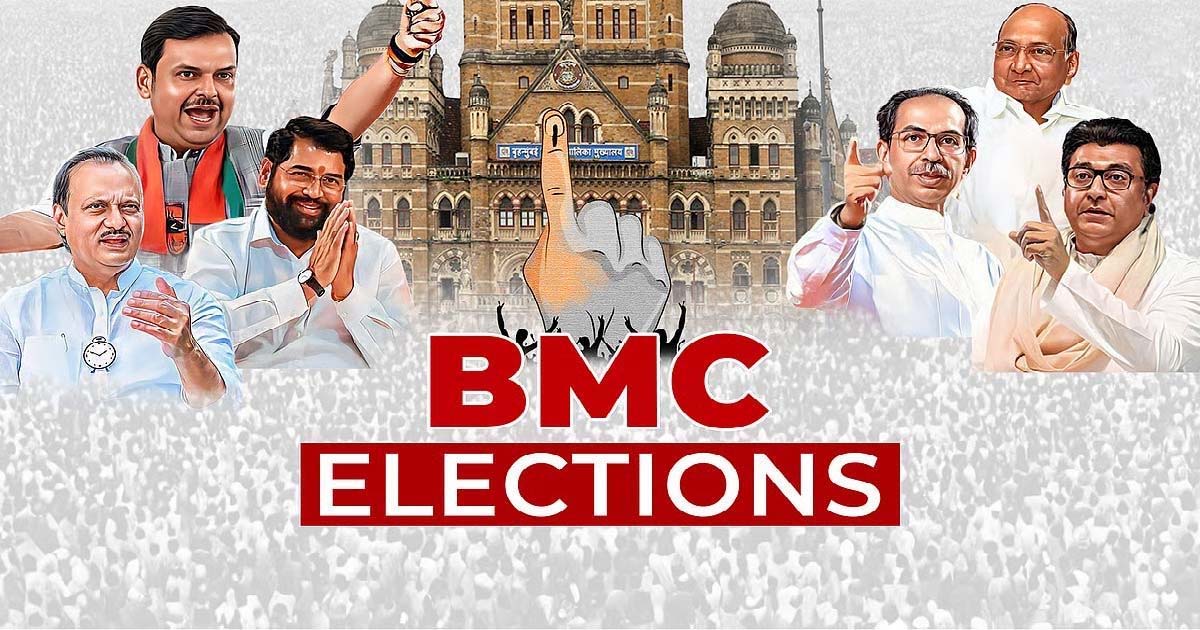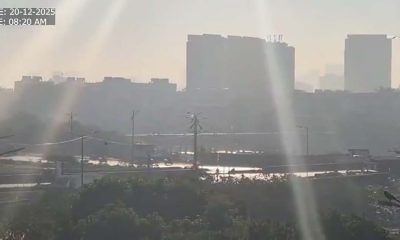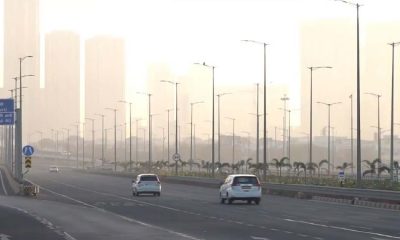General
Long Queues At Petrol Pumps Across India As Truck Drivers Protest Against New Provision Under Hit & Run

A day after Private bus and truck drivers staged protest across India against a new hit-and-run law, which attracts a 7-10 year prison sentence for drivers falling foul of it, massive chaos struck in various parts of the country.
Commuters face major inconvenience as transport drivers protest against new provisions in hit-and-run case introduced by Bharatiya Nyaya Sanhita 2023.
Long queues at petrol pumps in Himachal
In Dharamshala of Himachal Pradesh, Long queues at petrol pumps were seen as Transport Association, drivers protested against new law on hit and run cases.
Similar situation in Maharashtra’s Nagpur
Visuals have also surfaced form Maharashtra’s Nagpur where Long queues were seen at petrol pumps due to the protests.
What is the strike all about?
Truck Drivers, taxi and bus operators have started a nation-wide strike to oppose the provision of ₹7 lakh penalty and 10-year jail term for hit-and-run cases under the newly-passed Bharatiya Nyaya Sanhita. The All India Motor Transport Congress says these provisions which have yet to come in force can lead to undue harassment, and must be recalled.
Fuel, fruits & Vegetable supply to take a hit?
Media reports said that over 70% of the estimated 1.20 lakh trucks, tempos and containers in the Mumbai Metropolitan Region (MMR) remained off the roads on Monday, and the three-day strike is likely to impact the distribution of fuel and hit fruits and vegetables supplies in the coming days.
Reports said that the truck drivers claimed that the law is completely unfair as regardless facts, in the case of an accident, it’s almost always the driver of the larger vehicle who is booked. Drivers further claimed that in most of the accidents they also suffer serious injuries but they receive no support.
Maharashtra
Abu Asim Azmi praised for introducing a bill against hate speeches and hate crimes, Muslim organizations called Abu Asim Azmi’s step commendable.

Mumbai: Leading Mumbai NGOs like OZ Seva Trust, Minara Masjid Trust, All India Ulema Board, Malik Liaquat Hussain Trust, National Uni-Ayush Activist Trust, Mumbai Central Association etc. today felicitated SP State President Abu Asim Azmi at Islam Gymkhana and appreciated his efforts to maintain unity and brotherhood in the society by respecting all religions in the Maharashtra Assembly. Azmi had introduced a bill in the Nagpur Assembly to enforce strict laws against religious hatred, blasphemy, prophets, religious leaders, and religious places, and hate speeches and hate crimes.
The event was organised at Islam Gymkhana, Mumbai. Addressing the event, Abu Asim Azmi said that nowadays hatred is being spread among the brothers by making objectionable or insulting inflammatory speeches against any religion, religious leader, religious book, religious place, Prophet Muhammad (PBUH). This poses a threat to peace and order. Therefore, we have presented this bill in the Legislative Assembly against those who insult any religion, religious leader, religious book, religious place, or Prophet. This bill proposes a penalty of imprisonment for up to 10 years and a fine of up to Rs 2 lakh for those who make slanderous statements about any religion, religious leader, religious book, or religious place or spread it on social media. Such a punishment will curb hate speech and hate crimes. MLA Raees Shaikh, State Working President Yousuf Abrani, Chief General Secretary Meeraj Siddiqui and Advocate Rizwan Merchant, Maulana Ijaz Kashmiri, Nizamuddin Rain, Naseem Siddiqui, Sarfaraz Arjo were present at the event.
Maharashtra
A split in Maha Vikas Aghadi before BMC elections, Congress’s slogan is ‘akela Chalo’

The trumpet of the municipal elections has sounded in the state. Voting for 29 municipal corporations will be held on January 15, while the counting of votes will be held on January 16 and the results will be announced. In this election, everyone’s attention will be focused on the Mumbai Municipal Corporation elections. The Shiv Sena Thackeray group will try to retain power in the Municipal Corporation. While Eknath Shinde’s Shiv Sena and BJP will try to rule the BMC in Mumbai. Negotiations on seat sharing are ongoing in Mahayoti, but the electoral understanding has not been completed yet. However, a major rift has arisen in the Maha Vikas Aghadi before the Mumbai Municipal Corporation elections. The Congress has announced to fight the Mumbai Municipal Corporation elections on its own. Due to which the competition in this election has intensified further.
Congress will fight the elections alone
Congress has announced to fight the Mumbai Municipal Corporation elections on its own. Congress’ Maharashtra in-charge Ramesh Chinnathala is currently on a visit to Maharashtra. After a meeting held in Mumbai today, Ramesh Chinnathala has said that he will fight the upcoming elections on his own. He said that there is a lot of corruption in Mumbai. That is why the Congress has decided to fight the elections alone. We have decided to fight against the BJP and the Shiv Sena Thackeray group. True patriots and secular people should support us in this fight. After coming to power, we will resolve the issues of the Mumbai Municipal Corporation in a good way. Therefore, I appeal to the voters to support us and we will develop Mumbai.
Mumbai Municipal Corporation Elections
The State Election Commission had announced the Mumbai Municipal Corporation elections in a press conference on December 15. According to this announcement, candidates will be able to file their applications from December 23 to December 30, 2025. The Election Commission will scrutinize the applications on December 31. Candidates can withdraw their applications till January 2, 2026. Voting for the Mumbai Municipal Corporation elections will be held on January 5. The voting will be held on January 16, 2026 and the results will be declared on the same day.
Maharashtra
After Babri, it’s Kashi Mathura’s turn. Baba Bageshwar Dham’s provocation in Mumbai.

Mumbai: After the Babri Masjid, now it is Kashi Mathura’s turn, the slogan and provocation has been given by Dhirendra Shastri Bageshwar Dham Baba here in Mumbai. While answering the question of journalists in Andheri, Bageshwar Dham said that the temple is ours and we cannot give it up. When Baba was asked that the dispute had ended after the Babri Masjid, then why is the process of finding temples in mosques going on, to which he said that there are temples in many places and the dispute here is old. On Hindu Rashtra, Bageshwar Dham made it clear that there is also room for Muslims in Hindu Rashtra, his aim is to strengthen Sanatan, while a pilgrimage for Hindu Rashtra will start in Maharashtra to promote Hindutva. He said that it is wrong to declare India a secular country because India has never been secular. He said that there is a need for brotherhood and unity in this country and for that he goes on pilgrimage. Baba, while spewing venom, said that if efforts are not made for Hindu Rashtra and Hindus are not united, then the time is not far when the invasion of India will take place. He said that highly educated doctors in the country are becoming terrorists. If there is a Hindu Rashtra, then a Muslim youth will become Abdul Kalam. Will the mayor of Mumbai be a Muslim or a Hindu? On this, Bageshwar Dham said that he is away from politics, so a candidate should be selected who is useful for the people.
-

 Crime3 years ago
Crime3 years agoClass 10 student jumps to death in Jaipur
-

 Maharashtra1 year ago
Maharashtra1 year agoMumbai Local Train Update: Central Railway’s New Timetable Comes Into Effect; Check Full List Of Revised Timings & Stations
-

 Maharashtra1 year ago
Maharashtra1 year agoMumbai To Go Toll-Free Tonight! Maharashtra Govt Announces Complete Toll Waiver For Light Motor Vehicles At All 5 Entry Points Of City
-

 Maharashtra1 year ago
Maharashtra1 year agoFalse photo of Imtiaz Jaleel’s rally, exposing the fooling conspiracy
-

 National News1 year ago
National News1 year agoMinistry of Railways rolls out Special Drive 4.0 with focus on digitisation, cleanliness, inclusiveness and grievance redressal
-

 Maharashtra1 year ago
Maharashtra1 year agoMaharashtra Elections 2024: Mumbai Metro & BEST Services Extended Till Midnight On Voting Day
-

 National News1 year ago
National News1 year agoJ&K: 4 Jawans Killed, 28 Injured After Bus Carrying BSF Personnel For Poll Duty Falls Into Gorge In Budgam; Terrifying Visuals Surface
-

 Crime1 year ago
Crime1 year agoBaba Siddique Murder: Mumbai Police Unable To Get Lawrence Bishnoi Custody Due To Home Ministry Order, Says Report






















